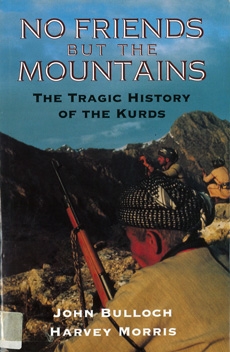| Éditeur : Penguin Books | Date & Lieu : 1992, London |
| Préface : | Pages : 242 |
| Traduction : | ISBN : 0-670-84323-7 |
| Langue : Anglais | Format : 145x230 mm |
| Code FIKP : Liv. Eng. Bul. Nof. N°2234 | Thème : Général |
|
Présentation
|
Table des Matières | Introduction | Identité | ||
 No Friends but the Mountains
| |||||
|
London and Oxford, 1991 Chapter One The Uprising Shortly before five on the afternoon of 29 March 1991 Massoud Barzani, fourth son of the legendary Mullah Mustafa and commander-in-chief of the Kurdish insurgent forces in northern Iraq, emerged from the guest house at Salahuddin which he had so recently commandeered from Saddam Hussein, posed briefly for a final photograph, climbed into his white super-saloon Toyota and drove away from the hill resort for a council of war with his rebel commanders. Kirkuk, the chief town of southern Kurdistan and the biggest prize that had been won in seven decades of almost uninterrupted Kurdish rebellion against Baghdad, had fallen to government troops the previous night after little more than a week in rebel hands. Arbil, at the edge of the plain 10 miles below Salahuddin, was surrounded by Saddam’s forces on two sides. The first refugees, travelling in trucks, cars and even in the buckets of bulldozers, were beginning to clog the roads to the mountains and the relative safety of the Turkish and Iranian borders. The Kurdish uprising, which in barely three weeks had succeeded in routing the Iraqi leader’s forces from one fifth of Iraqi territory, was virtually at an end. Barzani and his commanders were contemplating the collapse of the most dramatic, though short-lived, victory in modern Kurdish history. Yet even when the Kurds were forced to accept a formal ceasefire on 11 April, Barzani’s forces still controlled more territory than his father had managed to secure at the height of his powers in the early 1970s. What was more, the vast exodus of up to three million Kurds fleeing the anticipated … | ||||